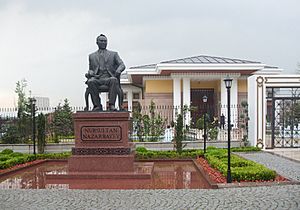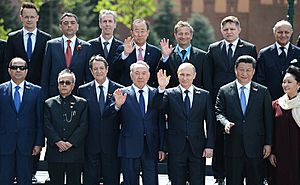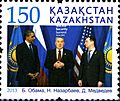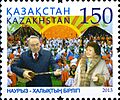Nursultan Nazarbayev facts for kids
Quick facts for kids
Nursultan Nazarbayev
|
|||||||||||||||||||||||||||||||||||||||||||
|---|---|---|---|---|---|---|---|---|---|---|---|---|---|---|---|---|---|---|---|---|---|---|---|---|---|---|---|---|---|---|---|---|---|---|---|---|---|---|---|---|---|---|---|
|
Нұрсұлтан Назарбаев
|
|||||||||||||||||||||||||||||||||||||||||||
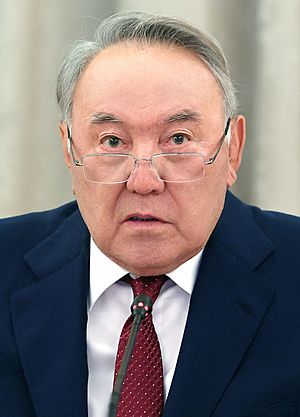
Nazarbayev in 2021
|
|||||||||||||||||||||||||||||||||||||||||||
| 1st President of Kazakhstan | |||||||||||||||||||||||||||||||||||||||||||
| In office 16 December 1991 – 20 March 2019 |
|||||||||||||||||||||||||||||||||||||||||||
| Prime Minister |
See list
|
||||||||||||||||||||||||||||||||||||||||||
| Vice President | Yerik Asanbayev (1991–96) | ||||||||||||||||||||||||||||||||||||||||||
| Preceded by | Office established (Himself as President of the Kazakh SSR) |
||||||||||||||||||||||||||||||||||||||||||
| Succeeded by | Kassym-Jomart Tokayev | ||||||||||||||||||||||||||||||||||||||||||
| Chairman of the Security Council of Kazakhstan | |||||||||||||||||||||||||||||||||||||||||||
| In office 21 August 1991 – 5 January 2022 |
|||||||||||||||||||||||||||||||||||||||||||
| Preceded by | Office established | ||||||||||||||||||||||||||||||||||||||||||
| Succeeded by | Kassym-Jomart Tokayev | ||||||||||||||||||||||||||||||||||||||||||
| Chairman of Nur Otan | |||||||||||||||||||||||||||||||||||||||||||
| In office 1 March 1999 – 28 January 2022 |
|||||||||||||||||||||||||||||||||||||||||||
| Acting |
See list
|
||||||||||||||||||||||||||||||||||||||||||
| Deputy |
See list
|
||||||||||||||||||||||||||||||||||||||||||
| First Deputy |
See list
|
||||||||||||||||||||||||||||||||||||||||||
| Preceded by | Office established | ||||||||||||||||||||||||||||||||||||||||||
| Succeeded by | Kassym-Jomart Tokayev | ||||||||||||||||||||||||||||||||||||||||||
| Chairman of the Assembly of People | |||||||||||||||||||||||||||||||||||||||||||
| In office 1 March 1995 – 28 April 2021 |
|||||||||||||||||||||||||||||||||||||||||||
| Preceded by | Office established | ||||||||||||||||||||||||||||||||||||||||||
| Succeeded by | Kassym-Jomart Tokayev | ||||||||||||||||||||||||||||||||||||||||||
| Honorary Chairman of the Assembly of People | |||||||||||||||||||||||||||||||||||||||||||
| In office 28 April 2021 – 5 January 2022 |
|||||||||||||||||||||||||||||||||||||||||||
| Preceded by | Office established | ||||||||||||||||||||||||||||||||||||||||||
| Succeeded by | Office abolished | ||||||||||||||||||||||||||||||||||||||||||
| Honorary Chairman of the Organization of Turkic States | |||||||||||||||||||||||||||||||||||||||||||
| Assumed office 25 April 2019 |
|||||||||||||||||||||||||||||||||||||||||||
|
|||||||||||||||||||||||||||||||||||||||||||
| Personal details | |||||||||||||||||||||||||||||||||||||||||||
| Born |
Nursultan Abishevich Nazarbayev
6 July 1940 Chemolgan, Kazakh SSR, Soviet Union |
||||||||||||||||||||||||||||||||||||||||||
| Political party | Amanat (since 1999) | ||||||||||||||||||||||||||||||||||||||||||
| Other political affiliations |
Communist (1962–1991) Independent (1991–1999) |
||||||||||||||||||||||||||||||||||||||||||
| Spouses |
|
||||||||||||||||||||||||||||||||||||||||||
| Children |
|
||||||||||||||||||||||||||||||||||||||||||
| Signature |  |
||||||||||||||||||||||||||||||||||||||||||
| Military service | |||||||||||||||||||||||||||||||||||||||||||
| Allegiance | |||||||||||||||||||||||||||||||||||||||||||
| Branch/service | Armed Forces of the Republic of Kazakhstan | ||||||||||||||||||||||||||||||||||||||||||
| Years of service | 1991–2019 | ||||||||||||||||||||||||||||||||||||||||||
| Rank | Supreme Commander |
||||||||||||||||||||||||||||||||||||||||||
|
Central institution membership
2019–present: Honorary Chairman, Organization of Turkic States
2021–2022: Honorary Chairman, Assembly of People of Kazakhstan 2019–2023: Honorary Member, Senate of Kazakhstan 2019–2023: Member, Constitutional Council of Kazakhstan 1999–2022: Chairman, Nur Otan 1995–2021: Chairman, Assembly of People of Kazakhstan 1991–2022: Chairman, Security Council of Kazakhstan 1989–1991: Member, 17th Secretariat of the Communist Party of Kazakhstan 1986–1990: Full member, 27th & 28th Central Committee of the Communist Party of the Soviet Union 1979–1984: 14th & 15th Secretariat of the Communist Party of Kazakhstan |
|||||||||||||||||||||||||||||||||||||||||||
Nursultan Abishuly Nazarbayev (Russian: Нурсултан Абишевич Назарбаев; Kazakh: Нұрсұлтан Әбішұлы Назарбаев, Nūrsūltan Äbışūly Nazarbaev, pronounced [nʊɾsʊɫˈtɑn æbɪ̞ɕʊˈɫɯ nɑzɑɾˈbɑjev]; born 6 July 1940) is a Kazakh politician and military officer. He served as the first President of Kazakhstan from the country's independence in 1991 until he formally stepped down in 2019. He also led the Security Council of Kazakhstan from 1991 to 2022.
Nazarbayev was one of the world's longest-serving non-royal leaders. He guided Kazakhstan for almost three decades. His leadership style was very strong, and he made most of the decisions for the country.
Contents
Early Life and Career
Nazarbayev was born in Chemolgan, a small town near Almaty. At that time, Kazakhstan was part of the Soviet Union. His parents, Ábish and Aljan Nazarbayev, were not wealthy. His father worked for a rich family until the Soviet government took their farmland in the 1930s. After this, his family lived a nomadic life in the mountains. They followed the Sunni Islam religion.
After World War II, his family returned to Chemolgan. In 1948, Nazarbayev started school and learned Russian. He lived with his uncle for a short time because his parents did not have a home there. Nazarbayev later chose to live in the upper part of Chemolgan, where many ethnic Russians lived. This helped him become fluent in Russian. In 1957, he went to a boarding school in Kaskelen.
After school, Nazarbayev received a scholarship to study at the Karaganda Steel Mill in Temirtau. He also trained at a steel plant in Dniprodzerzhynsk. By the age of 20, he was earning a good wage doing difficult and dangerous work. On 25 August 1962, he married Sara Nazarbayeva, who worked at the same steel mill. They had three daughters: Dariga (born 1963), Dinara (born 1967), and Aliya (born 1980).
On 15 November 1962, Nazarbayev joined the Communist Party. He became an important member of the Young Communist League (Komsomol). He worked full-time for the party while studying at the Karagandy Polytechnic Institute. In 1972, he became the secretary of the Communist Party Committee at the Karaganda Metallurgical Kombinat. Four years later, he became the Second Secretary of the Karaganda Regional Party Committee.
In his role, Nazarbayev handled legal documents and solved problems in factories. He also met with workers to help them with their issues. He later wrote that the Soviet system had problems. He saw that poor infrastructure and overworked staff were common issues. He felt these problems at the steel plant showed the bigger issues in the Soviet Union.
Political Career
Nazarbayev started his political journey in 1962. He joined the Communist Party of the Soviet Union while working in a steel factory. He held important roles within the party. In 1984, he became the Prime Minister of the Kazakh SSR. This appointment was made by Dinmukhamed Kunaev.
In 1989, Nazarbayev became the First Secretary of the Communist Party of Kazakhstan. In 1990, he was elected as Kazakhstan's first president. This election was held by the Supreme Soviet. Nazarbayev played a key role in opposing the 1991 coup attempt by Soviet leaders. This event led to the end of the Soviet Union.
Presidency (1990–2019)
Nazarbayev led Kazakhstan with a strong hand. He held a lot of power for a long time. There were concerns about how people's rights were protected and how much freedom they had to express different opinions. In 1995, he governed the country by special orders. This happened when the Supreme Council was not active.
In April 1995, a public vote extended his presidency until 2000. Later, in August, another public vote approved a new constitution. This new constitution gave the president much more power. These actions helped Nazarbayev gain more control over the country's politics.
In 1999, Nazarbayev was re-elected for what was officially his first term. A ruling in 2000 allowed him to run again in 2005. Later, a change in the constitution in 2007 removed term limits just for him. This allowed him to be re-elected in 2011 and 2015. He served as president for a fourth and fifth term. In 2018, the Parliament allowed Nazarbayev to lead the Security Council for life.
During Nazarbayev's time as president, Kazakhstan's economy grew quickly in the 2000s. This was thanks to high oil prices and changes that opened up the market. Kazakhstan became an important economic power in Central Asia. Money from other countries was invested in key industries. This helped modernize the country and build new infrastructure.
Nazarbayev also focused on good relationships with major world powers. He helped Kazakhstan join regional groups like the Eurasian Economic Union and the Commonwealth of Independent States. Kazakhstan also became a member of the World Trade Organization. He was important in efforts to reduce nuclear weapons. He gave up the country's nuclear arsenal and closed the Semipalatinsk Test Site.
Despite these successes, there were challenges. Some issues included fairness and family members getting special treatment. These problems made it harder for Kazakhstan to be fully open and accountable. Nazarbayev's time as president also faced economic difficulties. This included the 2007–2008 financial crisis, which caused periods of rising prices.
In March 2019, Nazarbayev stepped down as president. This happened during anti-government protests. His close ally, Kassym-Jomart Tokayev, took over. Tokayev won the next election in June 2019. Nazarbayev was protected from criminal charges until 2022. This protection was removed after a constitutional vote. He continued to lead the Assembly of People of Kazakhstan and Nur Otan until 2021. He was also the chairman of the Security Council until he was removed in 2022. This happened during the 2022 unrest. He was an honorary member of the Senate of Kazakhstan and the Constitutional Council until 2023.
Even after his resignation, some believe he still has influence in the country. In November 2019, Nazarbayev was named the Honorary Chair of the Central Asian Consultative Meeting. This was announced in Tashkent.
Personal Life
Nursultan Nazarbayev identifies as a Muslim. He has said his spiritual beliefs are based on the words of Abai Qunanbaiuly. Abai was a Kazakh poet whose ideas were based on an enlightened Islam. Nazarbayev believes Abai's "Words of Wisdom" helped him build a modern Kazakhstan. This was after the Soviet Union broke apart.
Nazarbayev is married to Sara Alpysqyzy Nazarbayeva. They have three daughters: Dariga, Dinara, and Aliya. Aliya's first marriage was to Aidar Akayev. He was the eldest son of former President of Kyrgyzstan Askar Akayev. This made the two Central Asian leaders related for a short time.
Having grown up in the Soviet Union, Nazarbayev speaks Kazakh and Russian fluently. He also understands English. He has two brothers, Satybaldy (1947–1980) and Bolat (born 1953). He also has one sister named Anip. On 16 August 2020, Nazarbayev's grandson, Aisultan, sadly passed away in London. He reportedly died from a heart problem.
In June 2020, it was reported that Nazarbayev had tested positive for COVID-19. A spokesperson said he would isolate and work from home. By July 2020, Nazarbayev had recovered. He later mentioned that Russian doctors helped him recover.
In an interview in October 2021, Nazarbayev shared that he had a spine illness in 2011. He said this health issue was one of the reasons he decided to resign from the presidency. In January 2023, Nursultan Nazarbayev had successful heart surgery in Astana.
He gave his last name to his grandchildren: Aisultan Nazarbayev (1990-2020) and Nabi Nazarbayev (2008).
Honours
Nursultan Nazarbayev has received many awards and honours from Kazakhstan and other countries. Here are some of them:
Kazakhstan
- Order of the Golden Eagle
- Order of the First President of Kazakhstan – Leader of the Nation Nursultan Nazarbayev
- Medal "Astana"
- Medal for "10 Years of the Independence of the Republic of Kazakhstan"
- Medal for "10th Anniversary of the Armed Forces of the Republic of Kazakhstan"
- Medal for "10th Anniversary of the Constitution of the Republic of Kazakhstan"
- Medal "In Commemoration of the 100th Anniversary of the Railway of Kazakhstan"
- Medal for "10 Years of the Parliament of the Republic of Kazakhstan"
- Medal for "50 Years of the Virgin Lands"
- Jubilee Medal "60 Years of Victory in the Great Patriotic War 1941-1945"
- Medal for "10 Years of the City of Astana"
- Medal for "20 Years of the Independence of the Republic of Kazakhstan"
- Algys Order
Soviet Union
- Order of the Red Banner of Labour
- Order of the Badge of Honour
- Medal "For the Development of Virgin Lands"
- Jubilee Medal "70 Years of the Armed Forces of the USSR"
Russian Federation
 Russia:
Russia:
- Order of St. Andrew the Apostle the First-Called
- Order of Alexander Nevsky
- Medal "In Commemoration of the 1000th Anniversary of Kazan"
- Medal "In Commemoration of the 300th Anniversary of Saint Petersburg"
- Medal "In Commemoration of the 850th Anniversary of Moscow"
 Chechnya:
Chechnya:
- Order of Akhmad Kadyrov
 Tatarstan:
Tatarstan:
- Order "For Merits to the Fatherland"
Foreign Awards
 Afghanistan: Amir Amanullah Khan Award
Afghanistan: Amir Amanullah Khan Award Austria: Grand Star of the Decoration of Honour for Services to the Republic of Austria
Austria: Grand Star of the Decoration of Honour for Services to the Republic of Austria Azerbaijan: Heydar Aliyev Order
Azerbaijan: Heydar Aliyev Order Belarus: Order of Friendship of Peoples
Belarus: Order of Friendship of Peoples Belgium: Grand Cordon of the Order of Leopold
Belgium: Grand Cordon of the Order of Leopold China: Order of Friendship (28 April 2019)
China: Order of Friendship (28 April 2019) Croatia: Grand Cross of the Grand Order of King Tomislav
Croatia: Grand Cross of the Grand Order of King Tomislav Egypt: Grand Cordon of the Order of the Nile
Egypt: Grand Cordon of the Order of the Nile Estonia: First Class with Collar of the Order of the Cross of Terra Mariana
Estonia: First Class with Collar of the Order of the Cross of Terra Mariana Finland: Grand Cross with Collar of the Order of the White Rose of Finland
Finland: Grand Cross with Collar of the Order of the White Rose of Finland Finland: Commander Grand Cross of the Order of the Lion of Finland
Finland: Commander Grand Cross of the Order of the Lion of Finland France: Grand Cross of the Order of Legion of Honour
France: Grand Cross of the Order of Legion of Honour Greece: Grand Cross of the Order of the Redeemer
Greece: Grand Cross of the Order of the Redeemer Hungary: Grand Cross with Chair of the Order of Merit of the Republic of Hungary
Hungary: Grand Cross with Chair of the Order of Merit of the Republic of Hungary Italy: Knight Grand Cross with Collar of the Order of Merit of the Italian Republic
Italy: Knight Grand Cross with Collar of the Order of Merit of the Italian Republic Japan: Grand Cordon of the Order of the Chrysanthemum
Japan: Grand Cordon of the Order of the Chrysanthemum Kyrgyzstan: Golden Order in honor of the 1000th anniversary of Manas
Kyrgyzstan: Golden Order in honor of the 1000th anniversary of Manas Latvia: Commander Grand Cross with Chain of the Order of the Three Stars
Latvia: Commander Grand Cross with Chain of the Order of the Three Stars Lithuania: Grand Cross of the Order of Vytautas the Great (5 May 2000)
Lithuania: Grand Cross of the Order of Vytautas the Great (5 May 2000) Luxembourg: Grand Cross of the Order of the Oak Crown
Luxembourg: Grand Cross of the Order of the Oak Crown Monaco: Grand Cross of the Order of Saint-Charles
Monaco: Grand Cross of the Order of Saint-Charles Organization of Turkic States: Supreme Order of Turkic World
Organization of Turkic States: Supreme Order of Turkic World Poland: Knight of the Order of the White Eagle
Poland: Knight of the Order of the White Eagle Qatar: Collar of the Order of Independence
Qatar: Collar of the Order of Independence Romania: Collar of the Order of the Star of Romania
Romania: Collar of the Order of the Star of Romania Serbia: First Class of the Order of the Republic of Serbia
Serbia: First Class of the Order of the Republic of Serbia Slovakia: First Class of the Order of the White Double Cross (2007)
Slovakia: First Class of the Order of the White Double Cross (2007) South Korea: Grand Order of Mugunghwa
South Korea: Grand Order of Mugunghwa Spain: Knight of the Collar of the Order of Isabella the Catholic (23 June 2017)
Spain: Knight of the Collar of the Order of Isabella the Catholic (23 June 2017) Tajikistan: Order of Ismoili Somoni
Tajikistan: Order of Ismoili Somoni Turkey: First Class of the Order of the State of Republic of Turkey (22 October 2009)
Turkey: First Class of the Order of the State of Republic of Turkey (22 October 2009) Ukraine: Member of the Order of Liberty
Ukraine: Member of the Order of Liberty Ukraine: First Class of the Order of Prince Yaroslav the Wise
Ukraine: First Class of the Order of Prince Yaroslav the Wise United Arab Emirates: Collar of the Order of Zayed
United Arab Emirates: Collar of the Order of Zayed United Kingdom: Honorary Knight Grand Cross of the Order of St Michael and St George
United Kingdom: Honorary Knight Grand Cross of the Order of St Michael and St George Uzbekistan: Gold Medal of Uzbekistan
Uzbekistan: Gold Medal of Uzbekistan
Other Recognitions
- A street in Amman, Jordan is named after him.
- He was named Turk El Ata (Spiritual Leader of the Turkic People) by the World Turks Qurultai.
- A street in Kazan, Russia was named after him.
- The capital of Kazakhstan, Astana, was named after him after his resignation in 2019. In September 2022, it went back to its original name, Astana.
Images for kids
-
Nazarbayev (three rows from left) at the 1992 World Economic Forum chaired by Henry Kissinger in Davos
-
Postage stamp with Nazarbayev, Barack Obama and Dmitry Medvedev
See also
 In Spanish: Nursultán Nazarbáyev para niños
In Spanish: Nursultán Nazarbáyev para niños
- Government of Kazakhstan
- List of national leaders
- Politics of Kazakhstan
 | William Lucy |
 | Charles Hayes |
 | Cleveland Robinson |


